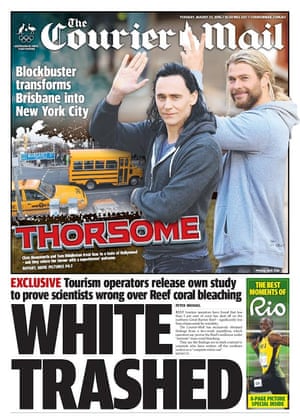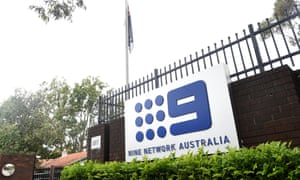Extract from The Guardian
The Courier Mail runs a
rosy take on the state of the Great Barrier Reef and the partnership
between the ABC and Swisse Wellness comes under fire
Channel
Nine’s legal bill was $7m higher than usual, in part because 60
Minutes’ crew ended up in a Lebanese jail. Photograph: Paul
Miller/AAP
Thursday
25 August 2016 18.23 AEST
Nine
ended up with a legal bill that was $7m higher than it usually is,
the network revealed on Thursday, in no small part because the 60
Minutes crew ended up in jail in Lebanon. The substantial legal bill
didn’t include the cash the network had to pay to Lebanese
authorities to get Tara Brown, Stephen Rice and the crew out of jail
either. Chief finance officer Greg Barnes admitted 60 Minutes plus a
stoush over streaming rights with regional affiliate WIN and another
legal battle with Seven, which accused them of stealing the format
for My Kitchen Rules, had blown out the budget: “Included in costs
were … a $7 million incremental legal cost associated with various
legal matters with WIN, Seven as well as the 60 Minutes Beirut
story”. The network’s poor performance was also attributed to
programming flops including Australia’s Got Talent, Farmer Wants a
Wife, Renovation Rumble, The Briefcase, The Verdict, and The
Hotplate. Nine reported an after-tax net profit for 2016 of $120m,
down 7% on last year.
Don’t rock the boat
A job
ad for a journalist at maritime publication Baird Maritime not
surprisingly asked for a competent journalist and editor who who was
passionate about ships, boats and the sea. Bizarrely however there
was another requirement specified in the seek.com.au posting.
Apparently the job would “not suit a safe
spaces/micro-aggression/social justice warrior type”. At least the
candidates know what they’re in for.
Come on over, the reef is fine
The
Courier Mail’s take on the bleaching of the Great Barrier was front
and centre on Monday in
a story headlined “White Trashed”. The Murdoch-owned
tabloid declared that the scientists were wrong and most of the reef
is in fact in pristine condition: “Reef tourism operators have
found less than five per cent of coral has died off — compared to
the 50 to 60 per cent estimated by scientists — under ‘extreme’
mass coral bleaching on the northern Great Barrier Reef,” the
report in the Queensland daily said.

The
Courier Mail front page on Monday. Photograph: News Corp Australia
The
story quoted local businesses Mike Ball Dive and Spirit of Freedom
who had commissioned teams of divers to survey “the hardest-hit
part of the reef from Bathurst Head to Raine Island”.
Spirit
of Freedom owner Chris Eade was motivated by global headlines which
had “damaged the reputation of the $5bn reef tourism industry”,
he said.
“Scientists
had written off that entire northern section as a complete
white-out,” Eade said.
“We
expected the worst but it is tremendous condition. Most of it is
pristine, the rest is in full recovery. It shows the resilience of
the reef.’’
Mike
Ball Dive boss Craig Stephen also found almost no change in the reef:
“It wasn’t until we got underwater that we could get a true
picture of what percentage of reef was bleached,” he said.
“The
discrepancy is phenomenal. It is so wrong. Everywhere we have been we
have found healthy reefs. There has been a great disservice [done] to
the Great Barrier Reef and tourism and it has not been good for our
industry.”
In
April, an aerial survey of the reef reported that up to 93% had been
hit by coral bleaching. Professor Terry Hughes, from James Cook
University and head of the National Coral Bleaching
taskforce, said
that the northern region of the reef was seeing mortality as high as
50% and he expected some reefs would exceed 90%. Hughes told
Guardian Australia: “We’ve never seen anything like this scale of
bleaching before. In the northern Great Barrier Reef, it’s like 10
cyclones have come ashore all at once.”
Bad taste award
While
we’re on Murdoch tabloids, the bad taste award must surely go to
The Daily Telegraph for its picture selection on the tragic story of
British backpacker Mia Ayliffe-Chung who was stabbed to death in a
Queensland hostel on Tuesday. With dozens more suitable snaps of the
21-year-old available online, the Tele’s editor, Chris Dore, chose
to publish on the front page on Thursday a photo of the murder victim
scantily clad in long black stockings and underwear.
A bitter pill for ABC supporters
There
was an immediate
outcry this week when the ABC announced it had entered into
a commercial partnership with Swisse Wellness, a vitamins and
supplements company which pays celebrities, including Nicole Kidman
and Sonia Kruger, to spruik its wares. The ABC’s international’s
arm, a multi-platform, international media service called Australia
Plus (A+), will now be branded with exclusive Swisse logos on its
online platforms, digital and social media channels and Australia
Plus TV.
Swisse
chief executive, Radek Sali, who also signed Monash University and
the Victorian state government as partners, was one of the few people
to be thrilled about the arrangement: “Our mission at Swisse is to
make people around the world healthier and happier, and through this
exciting partnership we will be able to take our message to a number
of new regions and audiences,” he said. One of the critics was Dr
Ken Harvey, an adjunct associate professor in the department of
epidemiology and preventive medicine at Monash University. “Swisse
have an unenviable reputation for marketing their products, both in
Australia and internationally,” Dr Harvey told Guardian Australia.
“Their
sales success reflect the large amount of money they spend on
marketing hype and the use of celebrities, not on science. Their
advertising claims have also been the subject of a number of
satirical segments on the ABC Checkout program,” Harvey said. In
2013 a story on the Checkout regarding some of the product claims was
the subject of a defamation lawsuit which was eventually settled out
of court.
But
the ABC has defended the deal, saying ABC International is “expressly
permitted under the ABC Act” to accept advertising and sponsorship.
“It does so in accordance with the ABC Editorial Policies, ensuring
that editorial decisions are in no way influenced by any companies,
government, universities or other organisations who advertise or
provide sponsorship on Australia Plus. Because of that, the existence
of sponsors and advertisers on Australia Plus has absolutely no
improper impact or influence on ABC editorial content on the
Australia Plus platform or anywhere else on the ABC.”
Worth paying for?
Andrew
Bolt’s book “Bolt: Worth Fighting For” (Wilkinson Publishing,
June 2016) is on an international mystery tour, courtesy of Bolt’s
fans. Every couple of days the Herald Sun columnist posts a
photograph of his book in an exotic location, on a train or in a
field of tulips, always urging readers to buy their own copy for just
$29.99 via a
helpful link. Bolt explains: “My book is an odyssey, visiting
Bath, the skulls of Montpellier, York Minster, Shanghai, Croatia, Ho
Chi Minh City, Santorini, London, Lake Como, Ithaca, Scotland, the
Bay of Naples, Dubrovnik, Fiji, Aileron, New Zealand, Sri Lanka, the
Andes, the Northern Territory, the Whitsundays, Kalgoorlie and
Condabri, Queensland, before invading Australia’s most leftwing
parliament – an experience which convinced one reader at the
Katharine River Mango Farm to try teaching even a donkey to
understand what’s in it. Meanwhile, it attended a christening in
Newcastle, checked in at a Penrith hospital and recuperated at the
Moreton Bay Boat Club before sailing down the Murray and visiting the
Mt Annan Australian Botanical Garden.” Could the endless publicity
Bolt has lavished on his tome be because it is selling rather poorly
in the bookshops? According to Bookscan figures, Worth Fighting For
has sold just 2,665 copies to date. For comparison Niki Savva’s
book about former PM Tony Abbott, Road to Ruin, has sold 34,496
copies since it came out in March.

No comments:
Post a Comment